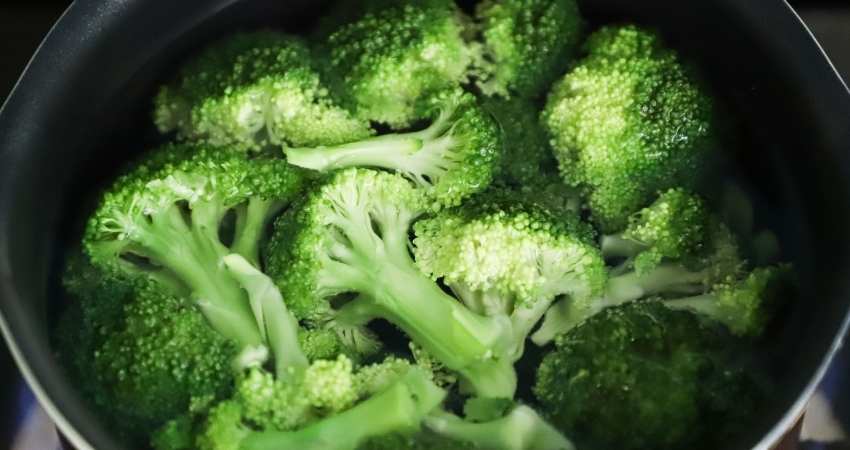Organic Broccoli – Here’s What You NEED To Know
Many people consider broccoli an essential part of their diet. When considering which broccoli to purchase, should broccoli be organic?
Broccoli should be organic because it’s untreated with synthetic pesticides. Between 2006 and 2011, the USDA inspected broccoli and found 60% contained the insecticide imidacloprid.
This article will take a more in-depth look at the differences between organic broccoli and conventional, including science based facts. I’ll start with imidacloprid, what it is and how it may affect you in a negative way.

As a Certified Health Coach many clients ask me about healthy vegetables including broccoli. Also, I purchase and consume it almost every day. Therefore, I have researched this topic in the past and present. Let’s examine this topic closely starting with imidacloprid.
What Is Imidacloprid?
Imidacloprid sounds like a crazy chemical of some kind, doesn’t it? Let’s have a look and see what this chemical is and what it does.
Imidacloprid is a neonicotinoid neurotoxic insecticide that attacks the central nervous system of insects. Neonicotinoids are responsible for damaging bee colonies and affecting bees’ sense of direction.
The insecticide is one of the potential reasons for beehive collapse seen across the planet near farming areas. It’s also one reason why class action lawsuits against companies for their neonicotinoid pesticides have found their way to courtrooms in North America and Europe alike.
The effects of neonicotinoids are both well documented in mammals like mice, rats and dogs. The impacts of Imidacloprid exposure in mammals include dizziness, locomotor effects, labored breathing, growth retardation and sometimes result in death.
Imidacloprid isn’t something you want to ingest and why the European Union banned neonicotinoids. Aside from proving to be a danger to bees, these insecticides are highly dangerous to mammals1.

Eating Non-Organic Broccoli
Just because some broccoli contained imidacloprid traces does not mean non-organic broccoli is unsafe. One should consider the EPA has banned many neonicotinoids containing pesticides.
However, it does not mean other pesticides or herbicides and fungicides have not found their way onto a broccoli crop2.
Broccoli has found a name as one of the ‘clean 15’ vegetables and fruits. It’s often found to contain low to no traces of pesticides. However, many of the studies done do not cross-reference the use of herbicides.
Although herbicides are formulated and engineered to target specific plants’ families, there’s not enough information to clearly state their human consumption safety.
Broccoli is a superfood and is an essential vegetable to add to your diet. Eating non-organic broccoli is not bad for you compared to not eating broccoli at all. Eating organic broccoli is always going to be healthier than non-organic broccoli.
Although traces of pesticides may be found to be non-existent in most samples taken of broccoli, there’re always the samples where chemicals were present that are a concern.
For example, if 90% of broccoli crowns tested showed no traces of pesticides, it would mean 10% of broccoli crowns tested do contain traces of pesticides.
Is Broccoli High In Pesticides?
Typically, broccoli is unfound to be high in pesticides. However, one should note it doesn’t mean having any pesticides whatsoever.
A 2014 study completed by the United States Department of Agriculture, found samples of domestic broccoli tested exceeded the established safe tolerance level of multiple types of pesticides.
Although some studies have shown most broccoli tests contain little to no pesticides, there is still the danger of receiving a sample positive for pesticides3.

2014 USDA Pesticide Study Results – Occurrences In Broccoli
The study done by the USDA in 20144 states that 1% of broccoli samples contained 1.2 times the EPA tolerance level of acetamiprid insecticide.
The same study found 7.3% of the samples showed three times the acceptable EPA tolerance level of a fungicide called Azoxystrobin. In addition, 0.7% of the samples tested included the insecticide bifenthrin. 1.8% tested positive for three times the acceptable level of a fungicide called Boscalid. 0.7% of the samples tested positive for an insecticide Buprofezin.
In addition, the tests showed 1% of the samples tested had four times the acceptable EPA limit of an insecticide called chlorantraniliprole.
To add insult to injury, 0.3% of the samples tested positive for Chlorpropham, a herbicide and growth regulator. 0.4% of the samples tested positive for the insecticide Chlorpyrifos.
Clothianidin was present in 7% of the samples at a rate of 1.9 times the amount of the tolerance labeled by the EPA. Additionally, cyfluthrin, another insecticide, was found in 7% of samples at 2.5 times of the acceptable limit.
There are many other pesticides, herbicides and fungicides found within samples of the study. The results inform us, although the levels may be considered in percentage, most of these occurrences were found to be at multiple times the toxicity of accepted EPA levels.
Removing Pesticides From Broccoli
Removing pesticides from broccoli may not be a major issue when the pesticide is used on the surface5. Surface pesticides might be possible to wash off when they are water-based. Other surface sprayed pesticides are not water-based or have oil-like hydrophobic nature. This is to avoid farmers requiring reapplication after a rain.
Pesticides that have soaked into the epidermis or layers of a vegetable will be a problem for people who want clean pesticide, free food.
Using water to rinse broccoli carefully is always a smart practice. There can also be surface dust and sand on broccoli.
One acclaimed method of removing pesticides from vegetables like broccoli is to fill a large bowl with four parts water and one part vinegar6. The solution helps to remove different types of pesticides from the outer skin of broccoli.
Again washing or soaking vegetables will not remove pesticides, herbicides, or fungicides leached into the plant. They will only remove surface chemicals, dust, or dirt.
Soaking vegetables in this solution for twenty minutes is reported to remove the most commonly used pesticides.
Another similar method of removing pesticides includes the use of saltwater. Not the saltwater one finds in the ocean, but a mixture of safe, clean water and table salt.
If you have any questions to ask me about this article don’t hesitate to comment below or email us. You can find an email on our contact page.
Read Next – More Food vs Food!
Spinach vs Broccoli: Which is Better? A Complete Comparison
Extra Virgin Oil Vs. Olive Oil: A Comparison
Farm Raised or Wild Caught Shrimp – Which Is Best?
Ceylon Vs Cassia Cinnamon: Which is Better?
- Environmental Working Group: EU Officials Warn of Health Risks from Pesticides Common on U.S. Fruits and Vegetables [↩]
- EWG: Clean Fifteen 2020 Shopper’s Guide to Pesticides in Produce [↩]
- University of Washington: Health Risks of Pesticides in Food [↩]
- USDA: Pesticide Data Program [↩]
- National Pesticide Information Center: Common Pesticide Questions [↩]
- Huffpost: Here’s The Best Way To Wash Fruit And Vegetables To Remove Pesticides [↩]
